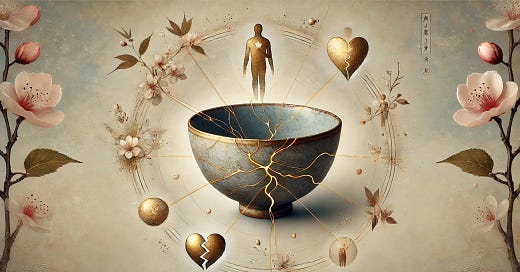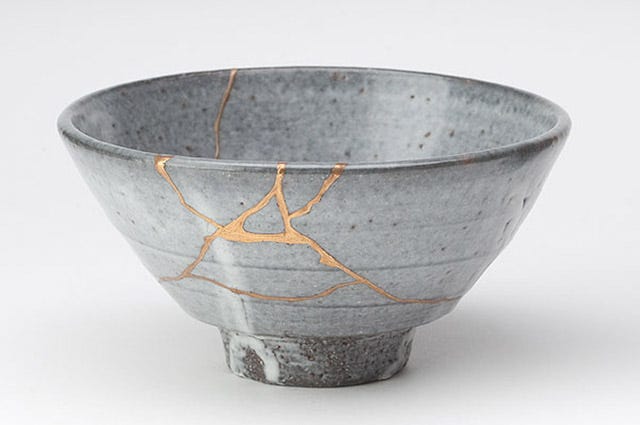Welcome to Polymathic Being, a place to explore counterintuitive insights across multiple domains. These essays take common topics and investigate them from different perspectives and disciplines to come up with unique insights and solutions.
Today's topic is one of my favorite mixed mental arts. Join in as we look at an old Japanese tradition and what that can teach us about relationships, culture, and yes, even things we own. Not everyone is as careful with precious things as we’d like. Yet not everything broken is lost. Let’s find out how Kintsugi can be applied to our lives.
Kintsugi is one of my favorite mixed mental arts concepts we’ve explored so far. While many of them focus on learning who we are internally, The Art of Mending looks at how we engage and can repair things we are connected to externally. It’s such a crucial concept that it was one of the original ideas I knew had to be in my debut novel Paradox and is introduced in Chapter 5:
What caught her attention were the obvious patchwork cracks across the delicate porcelain of the bowl. It looked like it had been mended with real gold.
“Yuki, this is a different tea set than normal…”
“Ah Kira, this is my oldest and most treasured tea set.” Yuki continued to prepare the table. “When you walked in you looked broken, not knowing what to do. I felt this tea set was appropriate.”
“What happened to it?”
“Not everyone is as careful with precious things as we’d like. Yet not everything broken is lost.”
“What do you mean?”
“Kintsugi,” Yuki stated. Kira looked up questioningly.
"There is an old tale about a tea master who accidentally dropped his most precious tea bowl during the ceremony and it shattered. He was devastated as the bowl had been handed down through generations. The craftsman he was serving asked to be able to take the fragments with him. Later he brought the bowl back repaired with golden seams. The tea master was shocked as his precious bowl was even more exquisite than before. The tea master learned that the beauty of the bowl, and indeed of life itself, lies not in perfection, but in the acceptance and celebration of its flaws."
In life, we break things all the time and, while Kintsugi is an art form for mending ceramics, it provides a wonderful analogy for mending relationships. We’ve all been there or are there; a mispoken word, righteous anger, betrayal… and something breaks. It bears repeating what Yuki said; “Not everyone is as careful with precious things as we’d like. Yet not everything broken is lost.”
Unlike ceramics, mending relationships requires both people to play which makes it more challenging. Let’s remember that we can only control one side of that equation. That’s why Kintsugi is one of the more advanced mental arts because we needed some of the other skills as a foundation. Kintsugi requires that we:
Recognize that We Know Nothing due to our own cognitive blindness. This helps ensure we approach with clearer vision and empathy to understand where the other person might be.
Accept that most of our engagements are Looking Into a Mirror where we aren’t always responding to the other person; we’re responding to ourselves if we were in their position.
Slow down and look at the Con[of] Text and ensure we aren’t reading too much of our own voice into something another person said.
Ensure we approach the other person with a strong understanding of their position by Steelmanning, not strawmanning them.
Accepting our own cognitive biases, recognizing we expect from others what we expect from ourselves, understanding their position even better than they do, and being careful about projecting our tone into communications provide the key ingredients, the gold if you will, needed to apply Kintugi in relationships. Let’s hand it back to Paradox:
“Yuki, when you talk of gold, you mean the gold of forgiveness and understanding, working together to fit the pieces back together and creating something even more precious than before?"
Yuki smiled. "Yes, Kira. Sometimes, the most profound beauty is found in broken places, where we have the opportunity to mend and grow, both as individuals and in our relationships with others. Embracing the concept of kintsugi in your own life may help you find a path to healing and reconciliation with your father."
“How many times has this bowl been broken?”
“Ahhhh, this bowl is very, very old Kira.” Yuki thought for a moment. “But the last time it broke it was because of me. I heard the story and snuck it out to look at it. I wasn’t the first to break it and I won’t be the last. We think the bowl may be over two hundred years old.”
“Broken by the same people who treasure it so much?”
“Always.” Yuki smiled again.
The Art of Mending isn’t a “once and done” concept. Then again, neither are any of our mental arts. They require constant analysis, updates, and refinement. That’s why Polymathic Being has the mantra Learn, Unlearn, Relearn. We might apply the idea in one situation and then find it works elsewhere, or maybe it doesn’t. We may have to adapt our tactics and adjust our goals. The point here with Kintsugi is that it’s a process we have to expect will need to be faced again, especially when dealing with the people we treasure.
In Application
The Art of Kintsugi is one of my favorite philosophical ideas. There’s so much insight to glean and so many different threads to weave as we look to repair and maintain our important relationships.
and I, if you look just right, are the intentional manifestations of Kintsugi.It’s not easy and it certainly isn’t painless, but when you look around you, do you see the cracks and fractures of relationships you’ve overlooked? You might be tempted to not risk any more damage but what you have is already fragile. Kintsugi provides a mechanism of repair that allows relationships to become antifragile.
Yuki’s ancestors could have thrown the bowl away when it first broke but, by intentionally repairing it, and continuing to repair it, the bowl has gained character and value and become something strong that you want to continue repairing. Not everyone is as careful with precious things as we’d like. Yet not everything broken is lost. Let’s start looking at our relationships with an eye for Kintsugi.
Curious whether Kira is able to repair the relationship with her father? Grab a copy of Paradox and find out! It’s packed full of more great insights like Kintsugi all wrapped up in a fast-paced adventure exploring AI and what it means to be human. Purchasing a copy is also a critical way to support my authoring and help get these ideas out there!
Enjoyed this post? Hit the ❤️ button above or below because it helps more people discover Substacks like this one and that’s a great thing. Also please share here or in your network to help us grow.
Polymathic Being is a reader-supported publication. Becoming a paid member keeps these essays open for everyone. Hurry and grab 20% off an annual subscription. That’s $24 a year or $2 a month. It’s just 50¢ an essay and makes a big difference.
Further Reading from Authors I Appreciate
I highly recommend the following Substacks for their great content and complementary explorations of topics that Polymathic Being shares.
- All-around great daily essays
- Insightful Life Tips and Tricks
- Highly useful insights into using AI for writing
- Integrating AI into education
- Computer Science for Everyone









![The Con[of]text](https://substackcdn.com/image/fetch/w_140,h_140,c_fill,f_auto,q_auto:good,fl_progressive:steep,g_auto/https%3A%2F%2Fsubstack-post-media.s3.amazonaws.com%2Fpublic%2Fimages%2F0fb48c6a-c494-4f78-90ec-9143ccd06c07_1024x1024.png)


When my father moved to the US, he noticed a stark cultural difference: broken electronic devices and household items were rarely repaired, unlike in India, where repair is often the first option. Instead, parts are immediately replaced, contributing to unnecessary waste.
If we apply Kintsugi and its philosophy of embracing imperfections, we could inspire a shift in how we treat physical objects and how we approach life. By valuing repair over replacement, we can reduce waste, learn from our mistakes, and embrace the flaws in ourselves and others as opportunities for growth. Kintsugi reminds us that brokenness is not the end—it’s a chance to create something even more meaningful.
Was it always gold used in the tradition of repairing? And if other, cheaper substances were used to repair, I wonder if they too have deeper meanings as the bond that holds the vessel together. Gold has a rich meaning, but seems not all would afford that means of repairing broken items. A deeper question arises then. Is it more difficult for those in poverty to repair broken bonds? 🤔 That’s an interesting topic too.